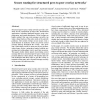Free Online Productivity Tools
i2Speak
i2Symbol
i2OCR
iTex2Img
iWeb2Print
iWeb2Shot
i2Type
iPdf2Split
iPdf2Merge
i2Bopomofo
i2Arabic
i2Style
i2Image
i2PDF
iLatex2Rtf
Sci2ools
123
click to vote
OSDI
2002
ACM
2002
ACM
Secure Routing for Structured Peer-to-Peer Overlay Networks
Structured peer-to-peer overlay networks provide a substrate for the construction of large-scale, decentralized applications, including distributed storage, group communication, and content distribution. These overlays are highly resilient; they can route messages correctly even when a large fraction of the nodes crash or the network partitions. But current overlays are not secure; even a small fraction of malicious nodes can prevent correct message delivery throughout the overlay. This problem is particularly serious in open peer-to-peer systems, where many diverse, autonomous parties without preexisting trust relationships wish to pool their resources. This paper studies attacks aimed at preventing correct message delivery in structured peer-to-peer overlays and presents defenses to these attacks. We describe and evaluate techniques that allow nodes to join the overlay, to maintain routing state, and to forward messages securely in the presence of malicious nodes.
Malicious Nodes | Operating System | OSDI 2002 | Peer-to-peer Overlay Networks | Structured Peer-to-peer Overlays |
Related Content
| Added | 03 Dec 2009 |
| Updated | 03 Dec 2009 |
| Type | Conference |
| Year | 2002 |
| Where | OSDI |
| Authors | Miguel Castro, Peter Druschel, Ayalvadi J. Ganesh, Antony I. T. Rowstron, Dan S. Wallach |
Comments (0)

